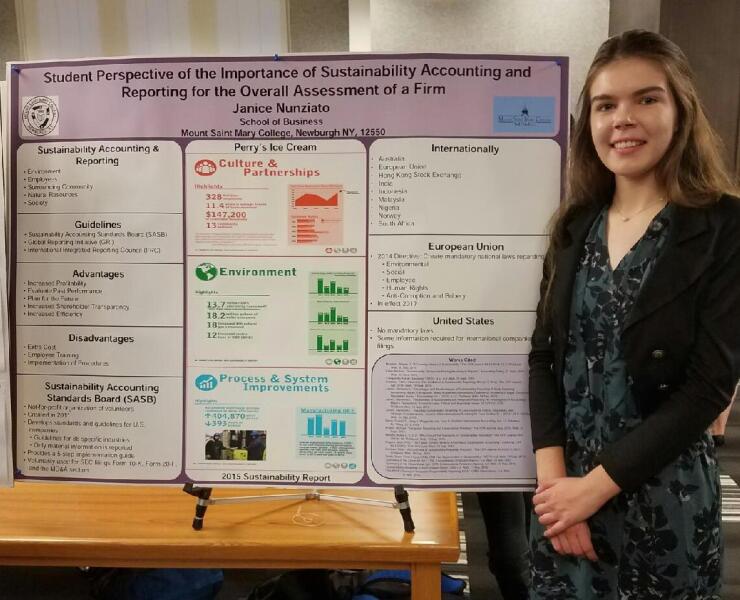
Accounting students have the arduous task of learning how to prepare and analyze financial reports. Like other users of financial data, they may wonder if the numbers alone are enough to evaluate a firm.
From the perspective of millennials, issues regarding quality of life, the environment and social responsibility are important considerations above and beyond the “bottom line” in their overall perspective and in the assessment of firms.
Accordingly, sustainability accounting and reporting is not only on the horizon as an upcoming mandate for businesses in the United States, but it also seems to be in alignment with the priorities of millennials who are next generation of accounting professionals.
Janice Nunziato, a senior accounting major at Mount Saint Mary College, recently completed an independent study on the topic of sustainability accounting and chose certain businesses as case studies for her analysis. She was selected to present her findings to the college community at a recent research event. It is our hope that her insights may also be interesting to the professional accounting community.
When Janice first began her research, the first task at hand was to understand what was meant by “sustainability accounting” and what the term encompassed. It is interesting to note that when the topic is searched, “sustainability” is often presented as the definition of sustainability accounting, which does not clarify the topic. It quickly becomes apparent that the topic is still emerging on the American horizon.
Although there is a global trend and many countries require SAR, there has yet to be such a mandate in the United States. Perhaps a concise explanation is that sustainability accounting and reporting allows companies to present qualitative, as well as quantitative, data about the management of the environment, social and human capital, and the priorities of corporate governance. This information provides information for investors, creditors and management that can be used to fairly assess the performance of a firm.
Case Study
Perry’s Ice Cream, which has one of the two largest ice cream manufacturing plants in New York State, voluntarily complies with sustainability reporting; it even employs a full-time director of sustainability and provides the following objective: “Our journey to a more sustainable future is focused around key sustainable challenges identified for their potential impact across all aspects of sustainability: people, planet and performance. By proactively managing our waste, acting responsibly with our natural resources and engaging our team members in sustainable thinking and actions, we will continue to thrive.”
By using a “case study” like Perry’s Ice Cream, Janice and her fellow students got a look at the added value that sustainability reporting may bring. For instance, among other sustainability data, Perry’s webpage and 2015 Sustainability Report presents details regarding:
1. Cultural and Partnerships
- Team: How their workforce is valued and they strive for creativity and innovation.
- Community: They participate in fundraising events and reward volunteer efforts.
- Safety: They strive for an environment of safety awareness and responsibility.
2. Environment
- Waste streams: reducing impact on landfills by reducing materials entering facility, repurposing byproducts and dairy waste, and recycling.
- Water: Striving to efficiently manage water used in production and clean-up.
- Electricity: Using electricity generated from renewable sources.
- Fuel: Reducing diesel fuel.
3. Grow and protect: To responsibly promote profit and growth.
4. Process and systems improvement: How the company plans to reduce waste and increase operational effectiveness.
Millennials
Janice believes sustainability accounting and reporting is an important area for future CPAs to be familiar with because more people, especially younger millennial professionals, want to see the qualitative value that businesses add:
- Companies should be responsible for more than just financial data reporting; they should be vested in their communities.
- Millennials want to be loyal to a company “that cares” because they are concerned about the environment and other social issues.
- Millennials “connect” with companies that can provide qualitative data in addition to quantitative data; the sustainability data provides a “personal” connection.
- A priority for younger professionals is to work for a company that is environmentally friendly with a commitment to enhancing the quality of life for employees. Many millennials would sacrifice income for family.
Thus, not only will sustainability accounting benefit potential creditors and investors, but the values projected in being socially responsible are crucial to be in harmony with the millennial workforce. Perhaps in the past, people lived to work, whereas millennials work to live and make family and leisure time a higher priority.
Companies may even need to be more open-minded regarding allowing employees to have the flexibility to work at home as part of their commitment to employee welfare; for millennials, productivity does not necessarily equate to visibility in the workplace. Younger professionals are “tech savvy” and can accomplish tasks without sitting in an office cubicle. To be productive companies must be aware of the changing workforce; embracing sustainability practices is crucial.
The mandate for sustainability accounting and reporting is clearly on the horizon for publicly traded companies in the United States. Although it may require a financial investment for firms to implement and report socially responsible practices, the benefits will, no doubt, far outweigh the costs. Socially responsible practices are a priority for millennials and reflect the demands of our evolving society.





